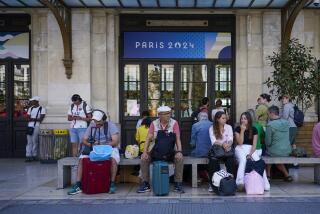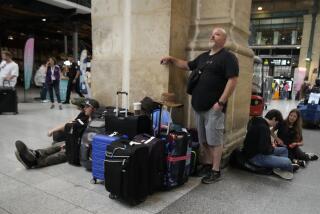India Calls for Calm as Rail Bombings Kill at Least 190
- Share via
MUMBAI, India — With frightening precision, eight explosions struck a busy commuter railway in rapid succession Tuesday evening in this bustling port city, killing 190 people, injuring hundreds and turning the rush hour into a grisly tableau of carnage.
In what officials said was a well-coordinated terrorist attack on India’s financial capital, the blasts went off within minutes of one another in trains and on platforms along the length of a north-south rail line carrying thousands of passengers to Mumbai’s suburbs. The force of the explosions reduced some train cars to smoking heaps of metal, blew others apart, and strewed luggage and body parts along the tracks.
There was no immediate claim of responsibility for the attack, and authorities did not say whether the explosions were set off by remote control or suicide bombers.
Confusion reigned for hours as police officers and ambulances tried to reach the blast sites, hampered by the city’s nightmarish traffic and the heavy rains of the monsoon season. Television footage showed victims trying to help one another or pressing cloths against their own bleeding wounds.
Police said 190 people were killed and more than 600 were injured, the Press Trust of India reported.
It was the most lethal attack on Mumbai, formerly known as Bombay, since 1993, when bombs believed to have been planted by underworld figures ripped through various parts of the city, including its famous stock exchange, and killed more than 250 people.
The new spasm of violence was also the deadliest to hit India since a series of bombs went off in New Delhi in October, an attack blamed on separatists fighting to turn the disputed region of Kashmir into an independent Muslim state or a part of archrival Pakistan.
Suspicion immediately fell on such militant groups in connection with Tuesday’s near-simultaneous explosions, a tactic favored by Kashmiri extremists.
Prime Minister Manmohan Singh condemned the attack, calling it a “shameful act” of terrorism and summoning members of his Cabinet for an emergency meeting Tuesday evening.
President Bush sent “deepest condolences to the friends and families of the victims,” saying such attacks “only strengthen the resolve of the international community to stand united against terrorism and to declare unequivocally that there is no justification for the vicious murder of innocent people.”
Security was stepped up across Mumbai, and other major cities such as New Delhi and Bangalore were put on high alert.
Home Minister Shivraj Patil told reporters that the government had received information of a planned assault but that the “place and time was not known.”
With rumors already swirling about the suspected involvement of Islamic militants in a country where religious tension often boils over into mob violence, Patil appealed to people to stay calm and refrain from jumping to conclusions.
“We will work to defeat the evil designs of terrorists and will not allow them to succeed,” he said.
Pakistan, too, was quick to denounce the attack as “a despicable act of terrorism.” India accuses the country of harboring, funding and arming the separatist groups in Kashmir, and peace talks between the two nuclear-armed neighbors, which have gone to war twice over their claims to the Himalayan territory, have made only incremental progress.
Hours before the Mumbai blasts, grenade attacks in Srinagar, the summer capital of the Indian-controlled portion of Kashmir, killed eight Indian tourists.
It was not known whether the events there and in Mumbai were connected.
The first explosion in Mumbai struck about 6:20 p.m. on one of the city’s key commuter railways, inaugurating a chain of blasts up and down the crowded line over the next quarter-hour.
A police official, who asked not to be identified because he was not authorized to talk to the media, said five of the bombs went off in the first-class compartments of trains and three exploded on platforms.
It appeared they were timed to inflict maximum damage during peak hours on a local rail network that serves an estimated 6 million people a day, mostly commuters heading in and out of the downtown financial center in the southern part of the city.
Witnesses described scenes of panic and gore: screaming passengers jumping out windows, severed limbs on the ground, clothes torn off scorched victims.
A deafening roar shook the car in which Shivali Bansal was riding, near the Borivili station.
“There was a blast in the next coach,” Bansal told an Indian television station. “A shard came and hit my husband in the neck.”
The able-bodied tried to pull the injured from the wreckage, in at least one case waiting more than an hour for emergency personnel to arrive. With so many casualties in so many places, resources were stretched thin.
Thousands of commuters were stranded, unable to find a way home or, because phones were jammed, even call their families to say they were a right. Steady rain compounded the misery.
Initial analysis pointed to the use of the plastic explosive RDX.
“The intensity of the blasts showed that very high-quality RDX was used,” the police official said.
The choice of Mumbai as a target was fraught with symbolism.
Arguably India’s most vibrant city and its commercial hub, it is home to the country’s biggest corporations and is the linchpin in the government’s plan to keep the economy growing at least 8% a year.
The Mumbai Stock Exchange commands international attention, as does the Bollywood film industry, whose glamorous stars frequent the exclusive restaurants and bars that have sprung up in the city in droves in recent years.
In the 1990s, the Indian government officially changed the city’s name from Bombay, a designation established during the British colonial era, to Mumbai, a name derived from a Hindu goddess.
With its gleaming skyscrapers and charming pockets of colonial ambience, Mumbai is the shiny new face of India that officials want to project to the world. They will be under pressure to show that the city can bounce back quickly.
“I am confident that the people of this great city have the will and the courage to face this situation,” said Singh, the prime minister.
But as cosmopolitan as it is, Mumbai has a troubled past. The attack was not the first aimed at the railway system; in March 2003, a passenger train bombing killed 11 people. A few months later, two car bombs ripped through the city almost simultaneously, killing more than 50.
Perhaps most searing on the city’s psyche was the bombing campaign of 1993 in which more than 250 died. Although authorities linked the attack to powerful figures in organized crime, the destructive riots that followed pitted Hindus against the Muslim minority.
Just this past weekend, hard-line Hindu nationalists brought Mumbai to a virtual standstill, rampaging through the streets to protest what they called the desecration of a memorial statue of a beloved leader’s wife. Rioters threw stones at Muslim-owned shops, set buses ablaze and paralyzed public transit.
Officials, fearing that the railway attack could stoke more unrest, urged residents to remain calm.
Shankhadeep Choudhury of The Times’ New Delhi Bureau contributed to this report.
More to Read
Sign up for Essential California
The most important California stories and recommendations in your inbox every morning.
You may occasionally receive promotional content from the Los Angeles Times.











